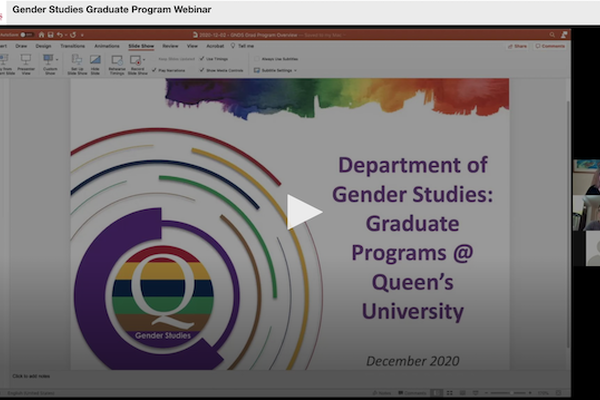Why Gender Studies?
Gender Studies opens doors for students to address growing concerns for inequity, equity and justice across national and global society. Gender Studies is a space where our theories and our practices pay attention to the differences and connections between diverse peoples worldwide.
As an interdisciplinary field, Gender Studies helps students take up social science, humanities, arts, and natural science methods and connect them to produce innovative new knowledge. Graduates of the PhD in Gender Studies at Queen’s work in such fields as education, health, law, public policy, social research, social work, media, art and community organizing. Gender Studies prepares students for both academic and nonacademic careers.
Why Queen's?
The Gender Studies MA and PhD programs teach critical race, gender and sexuality studies and their applications within work for social change. The one-year Gender Studies MA trains students in critical race, gender, and sexuality studies and social justice. The four-year Gender Studies PhD sustains our program focus on critical race, gender, and sexuality studies while offering advanced training in applications of gender studies research within work for social change.
Gender Studies at Queen’s distinctively foregrounds critical race conceptual frameworks at all levels of our undergraduate and graduate degree programs. Students examine gender, our key category of analysis, in terms of its interdependence with race, class, nation, sexuality, disability, age, religion, colonialism and globalization. Students conduct research in Canada and internationally and articulate their scholarship with local and global action for social justice. Students produce scholarship that is directly applicable to work for social change and to a wide variety of academic and nonacademic careers.
The Department embraces an approach to gender that explores and challenges racism, capitalism, colonialism, (hetero)sexism, ableism, and other manifestations of power. Read our previous statements.
Read more about the Department of Gender Studies at Queen's University
What are your current graduate students studying?
Gender Studies attracts students from diverse backgrounds and research interests. Check out our graduate student profiles to see what work is currently being done.

Research Areas
- Activism and Alliance Building
- Anti-Colonial Thought
- Anti-Racist Feminisms
- Black Geographies
- Colonialisms
- Diaspora
- Creative Emancipatory Work
- Critical History
- Ethnography
- Gender and Poverty
- Globalization, Work and Social Justice
- Health Studies
- Indigenous Studies
- Memory and Trauma
- Popular Culture
- Queer Studies
- Trans Studies
- Transnationalism and Diaspora
MA Program
The MA in Gender Studies is a one-year program. Full-time students take seven courses -- two (3.0 credit) required courses, four (3.0 credit) elective courses, and one (0.0 credit) Proseminar course in fall and winter semesters -- and complete a Major Research Paper (50 pages) during spring and summer. The elective courses may be selected from Gender Studies graduate courses (including GNDS 850/3.0, a practicum option), graduate courses in other departments, and independently organized directed readings.
PhD Program
The PhD in Gender Studies is a four-year program. Full-time PhD students complete three (3.0 credit) required courses, one (3.0 credit) elective course, one (0.0 credit) Proseminar course, and the (3.0 credit) PhD Practicum. Students advance to candidacy for the PhD after completing all coursework, syllabus, and practicum requirements and having successfully defended their dissertation proposal.
Faculty Supervisors
Students can be supervised by a Gender Studies faculty member or a Queen's University faculty member that has a cross-appointment within Gender Studies.
Applicants should speak with potential supervisors before they submit their application.
Applicants can indicate interest in working with more than one faculty member. We will accept applications where a supervisor has not been confirmed.
Funding and Awards
Full-time MA students are guaranteed funding of $16,000 and full-time PhD students are guaranteed funding of $20,000. These amounts are often exceeded. Funding typically goes to students as a combination of awards, Teaching Assistantships, Teaching Fellowships, and Research Assistantships.
Part-time students are not eligible for a funding package, but they may apply for employment at Queen’s including Teaching Assistant and Research Assistant positions.
Tuition
Funding packages do not include payment of tuition and fees. Students must pay tuition and fees directly.
Tuition and fees are set in the summer prior to the Fall term start.
Students pay tuition and fees for each term they are registered - fall, winter, and summer.
How to apply
December 1
Early consideration deadline. All applications that are completed by December 1st will be reviewed before the winter break.
February 1
Final application deadline
Other important information
Academic Prerequisites
English Proficiency
Admission Cycle
Application Process
Application Review and Decision
More information
The December 2020 webinar provides an overview of the MA and Phd programs, and answers common questions about the application process.






